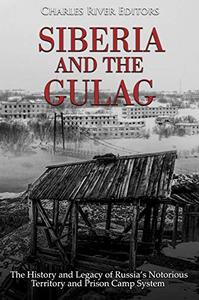
Siberia and the Gulag: The History and Legacy of Russia's Most Notorious Territory and Prison Camp System by Charles River Editors
English | January 16, 2019 | ISBN: 1793187886 | 135 pages | EPUB | 6.00 Mb
*Includes pictures
*Includes contemporary accounts
*Includes online resources and a bibliography for further reading
Over the long course of Russian history, perhaps no aspect of the giant country has generated interest quite like Siberia, the easternmost part of Russia that lies in Asia. Generally speaking, all that is widely known about Siberia is that it is really big and really cold, which, to be fair, are good starting points for a deeper exploration of this fascinating region. The name "Siberia" comes to English from Russian and was originally from the word "Sibir", a fortress of the Tatar people which was located on the Tobol and Irtysh Rivers . However, it referred more generally to the Khanate of Sibir, the land just east of the Urals that served as the gateway to a network of rivers that stretched all the way to the Pacific in the far east. Hence, it eventually gave its name to that entire region.
Despite making up nearly 66% of the country, Siberia is only inhabited by 40 million people, making it one of the most sparsely populated places on the planet. Given its brutal climate and the strategic depth offered by the region, it should perhaps come as no surprise that the region is best known today for being the location where political prisoners were sent to the infamous Russian labor camps.
One of the most idiosyncratic horrors of Soviet Russia was the Gulag system, an extensive network of forced labor and concentration camps. Part of the rationale behind this system was that it could serve as slave labor in the drive for industrialization, while also serving as a form of punishment. The name Gulag is in fact an acronym, approximating to "Main Administration of Camps" (in Russian: Glavnoe Upravlenie Lagerei) and operated by the Soviet Union's Ministry of the Interior. The Gulag consisted of internment camps, forced labor camps, psychiatric hospital facilities, and special laboratories, and its prisoners were known as zeks. Such was the closed and secretive nature of the Soviet state that to this day, knowledge of the Gulag system comes mainly from Western studies, firsthand accounts by prisoners such as Aleksandr Solzhenitsyn, and some local studies after the fall of communism.
The most recognizable version of the Gulag, a term that was never pluralized in Russia itself, existed from the 1930s-1950s, a period in which a huge network of camps and prisons was established across the vast Soviet federation. Prisoners were often used as forced labor, made to do physically arduous and soul-destroying tasks. Some workers helped to build large infrastructure projects, and indeed the system was partly rationalized in terms of economics.
Though it's often forgotten today, in many respects the Gulags represented a continuation (albeit a more far-reaching version) of the kind of punishment meted out during the Russian Empire under the Romanov dynasty, which was overthrown in 1917. Therefore, it is necessary to examine the system in the context of the broader history of Russia and its empire, even as the system of repression, imprisonment and punishment persisted for decades in the Soviet Union and has been primarily aligned with the rule of one leader: Josef Stalin. As the USSR's leader for almost 30 years and one of history's most notorious tyrants, Stalin was a believer in the economic utility of the Gulags' forced labor. He was so paranoid that he constantly saw potential enemies among his people, particularly his Bolshevik contemporaries. Stalin sent hundreds of thousands to the Gulags, notably in the 1930s during his "Great Terror" and after the end of the Second World War.
Siberia and the Gulag: The History and Legacy of Russia's Most Notorious Territory and Prison Camp System details the history of Siberia and the Soviet Gulag system. Along with pictures of important people, places, and events, you will learn about Siberia and the Gulag like never before.
Buy Premium From My Links To Get Resumable Support,Max Speed & Support Me

https://rapidgator.net/file/f21f904beb1875f6eb6cf87bd2adf372/8ipgy.Siberia.and.the.Gulag.The.History.and.Legacy.of.Russias.Most.Notorious.Territory.and.Prison.Camp.System.rar.html

http://nitro.download/view/EF52A35778177E2/8ipgy.Siberia.and.the.Gulag.The.History.and.Legacy.of.Russias.Most.Notorious.Territory.and.Prison.Camp.System.rar

https://uploadgig.com/file/download/91C87e9cacF9B9A4/8ipgy.Siberia.and.the.Gulag.The.History.and.Legacy.of.Russias.Most.Notorious.Territory.and.Prison.Camp.System.rar
 Views: 32
Views: 32  Comments (0)
Comments (0)
free Siberia and the Gulag The History and Legacy of Russia's Most Notorious Territory and Prison Camp System, Downloads Siberia and the Gulag The History and Legacy of Russia's Most Notorious Territory and Prison Camp System, RapidShare Siberia and the Gulag The History and Legacy of Russia's Most Notorious Territory and Prison Camp System, Megaupload Siberia and the Gulag The History and Legacy of Russia's Most Notorious Territory and Prison Camp System, Mediafire Siberia and the Gulag The History and Legacy of Russia's Most Notorious Territory and Prison Camp System, DepositFiles Siberia and the Gulag The History and Legacy of Russia's Most Notorious Territory and Prison Camp System, HotFile Siberia and the Gulag The History and Legacy of Russia's Most Notorious Territory and Prison Camp System, Uploading Siberia and the Gulag The History and Legacy of Russia's Most Notorious Territory and Prison Camp System, Easy-Share Siberia and the Gulag The History and Legacy of Russia's Most Notorious Territory and Prison Camp System, FileFactory Siberia and the Gulag The History and Legacy of Russia's Most Notorious Territory and Prison Camp System, Vip-File Siberia and the Gulag The History and Legacy of Russia's Most Notorious Territory and Prison Camp System, Shared Siberia and the Gulag The History and Legacy of Russia's Most Notorious Territory and Prison Camp System, Please feel free to post your Siberia and the Gulag The History and Legacy of Russia's Most Notorious Territory and Prison Camp System Download, Movie, Game, Software, Mp3, video, subtitle, sample, torrent, NFO, Crack, uploaded, putlocker, Rapidgator, mediafire, Netload, Zippyshare, Extabit, 4shared, Serial, keygen, Watch online, requirements or whatever-related comments here.
Related Downloads :

